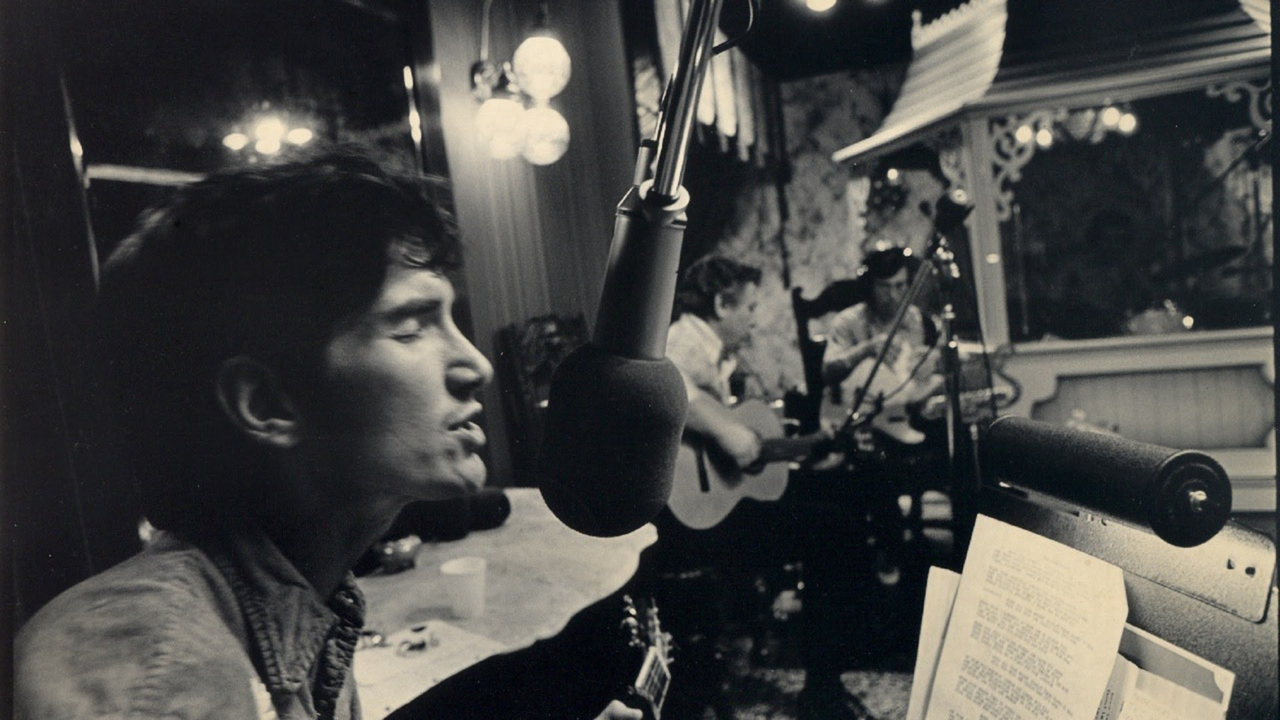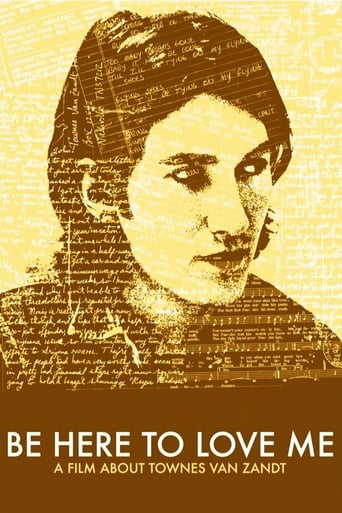Exoticalot
People are voting emotionally.
AshUnow
This is a small, humorous movie in some ways, but it has a huge heart. What a nice experience.
Kaydan Christian
A terrific literary drama and character piece that shows how the process of creating art can be seen differently by those doing it and those looking at it from the outside.
Hattie
I didn’t really have many expectations going into the movie (good or bad), but I actually really enjoyed it. I really liked the characters and the banter between them.
lucius_420
Woah! Had to chop several chunks of my full review to make it fit into the 1000 word limit. I read every word of every review at time of posting and I'm slightly disgusted by seeing only 18 reviews 5 years after release and that the writing is not more persuasive. Oddly, I was unimpressed with favorable reviews by Townes' admirers only because their eloquence with words was few and far between, even though there were some good bits. My favorite review was the worst rated one, because of these words: "nor is there any attempt to give you any sense of what he did other than write songs". Well that is Townes Van Zandt in a nutshell. He didn't really do much with his life except for "write songs" and even his own family barely knew him after they approved the electroshock therapy.'Heartworn Highways' documents the true birth of the scene called "outlaw country music". There's not as much footage as I'd like, but the stories about him by people who knew him well are a river of carefully crafted words that any appreciator of a good story should love instantly. Music and poetry are Townes' breath and blood. His life is many peoples' stories, and everyone knows parts, but no one knows the whole thing 100%. Susanna Clark might know more than anyone else possibly.The film centers around a few tapes recorded by a friend whom Townes confided in over the phone. Director Margaret Brown shows that she has brains simply by her choice of subject. In one tape, Townes clearly recaps his early musical birth, that when he was 8 years old he saw Elvis Presley (on the television at his home deep in the heart of Fort Worth, Texas, unlike Gram Parsons and Tom Petty who both met Elvis in person) and the next Christmas his father bought him a guitar. He remembered something about learning some songs and going to the school and making all the girls go crazy and then going home a hero. He details how he penned his first country/western single 'Waitin' Around to Die' when he had been "locking myself up in the closet for weeks on end with the phone off the hook and listening to early Bob Dylan and Lightning Hopkins". There is so only one biography I know of in print (on my shelf) called 'To Live is to Fly'. It is only able to tell part of the story. Much of it is unknown or not very well documented. The author states that he tried to interview Susanna Clark and got rebuffed by her because she is writing her own book about him or something like that. Guy says that Susanna and Townes were kind of like soul mates.Townes said Doc Watson was the first person to officially cover one of his songs, told everyone that Lightnin' Hopkins gave him his first joint (possibly true), and the last major band he tried to produce with was Sonic Youth. Something I discovered while researching online was that Townes died tragically on January 1st, 1997 and the great country music legend Hank Williams also tragically died on January 1st, 1953 exactly 44 years to the day. You must watch the bonus interviews on the DVD to see his bonus interviews where Guy Clark says, "Even though sometimes there's a lot of words, there's a lot of phonetic hot licks going on, it's the holes you leave, you know, emotionally in the story line and Townes was like...he was so good it sounds unconscious. I don't believe it was...he knew what he was doing...I knew Townes, he's a smart S.O.B., and he's the coolest guy that ever walked, BUT he was not unaware of how good he was and what he was doing...It wasn't magic. It was (expletive) hard work and paying attention." Guy Clark talks about when Townes was at his best and could perform songs that would just take your breath away. "That's our goal as songwriters, is to try to hit that mark."There are hilarious stories in the DVD extras from Leland Waddell about trying to once-and-for-all cure Townes of his suicidal tendencies by actually giving him a loaded shotgun, driving backward 40 miles to a gig in Lubbock that was already canceled because of the rain, and letting the tramps take his nice shirt and moccasins while picking a grave site because he drove off after they saw him drag an passed-out drunk Townes to the grave site. Johnny Guess says he was Townes' witness inside a little trailer when Bob Dylan wanted to meet Townes and they met in a blocked off part of Guadalupe street (the "drag" in front of the University of Texas) and when Bob Dylan got to meet Townes Van Zandt and hear him play and sing, Johnny Guess said his jaw was dropped wide open because he got to meet Townes Van Zandt. "That was Bob Dylan. It doesn't get any better than that." There are many great arrangements of words a person can have ingrained upon their memory after watching this movie. I think my favorite quote from Townes in the film is from the 1995 Amsterdam interview where he says, "I try to write about things that matter and make every song good." The best part of the film for me is when John Lomax III calmly tells us (with tears flowing down his face) about when he tried to manage and get to the bottom of the business affairs of Townes Van Zandt and put an advertisement out for fan mail to "America's Greatest Songwriter" and the letters he got from tons of people said that listening to this guy's music had saved their lives, that they were on the verge of suicide and his music brought them back, or they had lost a loved one and his songs had helped them get through a tough time.
haverslick
If you aren't absolutely amazed by Townes' songwriting, finger picking, and singing, all you have to do is pick up a guitar to realize how difficult it is to do what he's doing. He's actually doing three or four things at once: Plucking a bass line with his thumb, a melody with his remaining fingers, and to top it all off, he sings absolutely hauntingly over this intricate accompaniment.When Kristofferson called Townes a "songwriter's songwriter," this is made even truer by the fact that most of his biggest fans are musicians, because of his dedication and the perfection he achieves in his songs. It is truly songwriting rocket science. After I discovered Townes, I hardly ever strummed my guitar anymore, but rather try to keep it mostly fingerstyle.Townes' greatness stemmed from what is the lifeblood of most all great musicians: persistence and dedication (and drugs), at least to his art, if not to the business side of things. Like he said; "You've got to lock yourself in your apartment, take the phone off the hook, and listen to Lightnin' Hopkins for two weeks."
Chris Knipp
The straightforward title signals a straightforward piece of work: Be There to Love Me is a documentary about singer-songwriter Townes van Zandt. He's the kind of guy who looks real cool at first, but when you learn about how he lived and what he went through and put other people through, he doesn't seem so cool.Be that as it may, Van Zandt wrote wonderful songs, poetic and sad, blues and country, and Kris Kristofferson called him "a songwriter's songwriter." His life was a strange mixture from the start. He was depressed and sniffed glue as a young teenager: the glue wrecked his teeth, aside from what it did to his brain. He was also an athlete, wrestling, baseball, football, and he was a handsome lean man who never got wide or lost his hair. His depression caused him to throw himself off a roof and his mother wanted to do something, so she had him sent to a hospital around Memphis where he got insulin shock treatments. This is something his mother regretted till her dying day. It took away all Townes's childhood memories and robbed him of a chunk of his personality. When he talks, you feel that something's missing. There's a distance, as if he's watching himself, as if he's not quite there. And he isn't.Van Zandt remained gloomy and wrote about death in his songs, He drank and did drugs, but also went on the road – an act of self destruction but also an act of self denial, paring down to be creative – to write songs and sing them. Eventually he became quite well known, traveled with a little crew, and famous singers did covers of his songs, including Willie Nelson and Emmylou Harris. He died of heart failure at 52. He had three wives and I think one daughter and two sons.This documentary uses a lot of old footage, even of Townes as a young child. His family was pretty well off – which he is said to have regretted, because his songs are of the poor, lonely, and hopeless. This documentary achieves a kind of truth even though there is little that is distinctive about it but the songs. As a good documentary should, it serves its subject humbly.
Pithybrid
I was lucky enough to view this film at the Toronto Film Festival. As a longtime, and pretty rabid Townes Van Zandt fan, I was very impressed with the film. Director Margaret Brown did a fantastic job. Her film showed the tragedy, humor and beauty that made up Townes. I had a chance to talk to her briefly after the screening, and you could tell that this was really a labor of love. The interviews in this seem like a who's who of singer/songwriter music, featuring Willie Nelson, Emmylou Harris, Steve Earle, Guy Clark and many more. Hopefully it will find some sort of distribution on DVD. It is the type of film that deserves to be seen. Anyone who considers themselves a music fan should take any opportunity they have to see this film.

